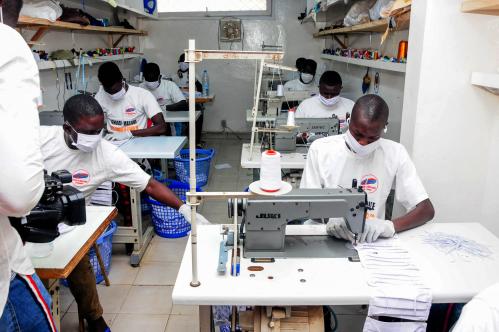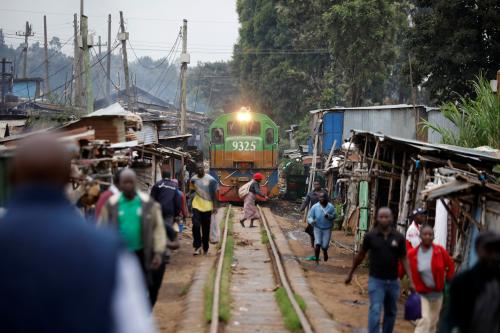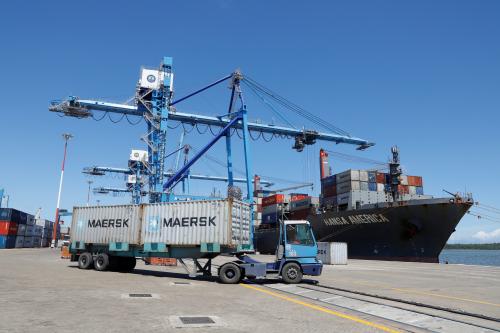African women vie for leadership positions
Two African women, Ngozi Okonjo-Iweala and Amina Mohamed, have been announced as candidates for director-general of the World Trade Organization (WTO), a position that has never been held by either a woman or an African. Okonjo-Iweala, Nigeria’s first female finance minister and first female foreign affairs minister, had a 25-year career at the World Bank and served as its managing director of operations from 2007-2011. As finance minister, she led negotiations with the Paris Club of Creditors to erase $30 billion of Nigerian debt. (Okonjo-Iweala is also a nonresident distinguished fellow at Brookings.) Mohamed served as Kenya’s foreign affairs and international trade minister from 2013 to 2018, a period which saw Kenya’s foreign direct investment inflows increase by 400 percent. She has also chaired the top two governing bodies of the WTO, the General Council (2005) and the Ministerial Conference (2015).
Electing a new chief of the WTO is a process that typically lasts nine months, but the WTO aims to condense it to three months following Roberto Azevêdo’s resignation in May. Now that the nomination period has closed, the eight candidates will join a special General Council meeting on July 15-17, where they will have the opportunity to share their platform and field questions from members of the council.
In related news, on Monday, Ghanaian presidential candidate John Mahama named Jane Naana Opoku-Agyeman his running mate for the upcoming election in December. Opoku-Agyeman, a former minister for education, is the first woman to be tapped as a vice presidential candidate of a major Ghanaian party. This will not be the first time Opoku-Agyeman has broken gender barriers. In 2008, she became the first female vice-chancellor of a state university in Ghana when she assumed the role for the University of Cape Coast.
Unrest in Ethiopia results in deaths and arrests
Over the past two weeks in Ethiopia, at least 239 have been killed and 3,500 arrested in unrest following the murder of popular musician and activist Hachalu Hundessa on June 29. It is as yet unknown why Hachalu, who was prominent in anti-government protests that led current Prime Minister Abiy Ahmed to power in 2018, was murdered.
Violence primarily took place in Oromia region, where 215 civilians, nine police officers, and five militia members were killed, and in Addis Ababa, where 10 were killed. Among those arrested was Jawar Mohammed, a well-known Oromo activist and opposition politician; Human Rights Watch has warned that the arrest of opposition figures “could make a volatile situation even worse.”
Abiy responded to the violence by deploying police and military forces and blocking access to the internet across the country. Abiy has also stated that the unrest will not derail plans to start filling the Grand Ethiopian Renaissance Dam this month. These plans have angered Egypt and Sudan, who argue that the dam, located on the Blue Nile River, will limit their countries’ access to an important source of fresh water.
Côte d’Ivoire’s prime minister dies
The political landscape in Côte d’Ivoire was upended this week with the death of the country’s prime minister Amadou Gon Coulibaly on Wednesday, July 8. Coulibaly, who had served as prime minister since 2017, had recently returned from France after undergoing treatment there for a heart condition.
Current President Alassane Ouattara had announced in March of this year that he would not run for a third term, despite suggesting that he was eligible to do so—a claim that is disputed by the opposition and large portions of the country’s population. Instead, the 61-year-old Coulibaly was to be his party’s candidate in the coming October 31 election. As of this writing, no one has been named to replace Coulibaly as the candidate for the ruling Rally of Houphouëtists for Democracy and Peace (RHDP) party.
Tanzania becomes middle-income country
Last Wednesday, July 1, the World Bank announced that Tanzania had reached middle-income status five years ahead of schedule. Middle-income countries are those considered to have a gross national income per capita between $1,006 and $3,955, per the World Bank 2018 classification. Tanzania earns this new status as a lower-middle-income country after many years of annual growth over 7 percent of GDP. As the second-largest economy in the East African Community (EAC), Tanzania joins fellow EAC member Kenya as middle-income countries; all other East African countries have low-income status.






Commentary
Africa in the news: African women vie for leadership positions; Ethiopia, Côte d’Ivoire, and Tanzania updates
July 11, 2020